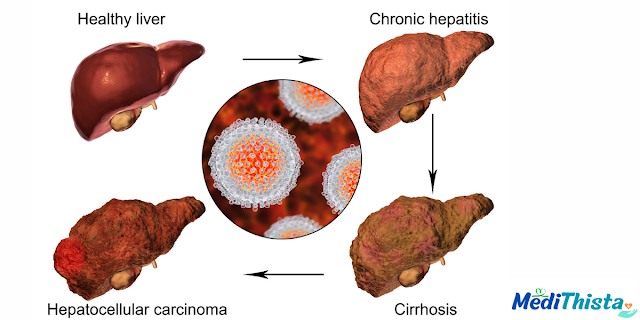Understanding Hepatitis B : Causes, Symptoms, and Treatment
Introduction:
Hepatitis B is a viral disease in which
virus attacks on liver cells and cause liver damage. Hepatitis B is due to the
hepatitis B virus (HBV), that is a member of the Hepadnaviridae own family of
viruses, which is transmitted thru blood, semen, vaginal secretions, and other
body fluids. Hepatitis B can lead to each acute and continual liver disorder
and can purpose cirrhosis and liver most cancers if left untreated.
Causes:
Here are some common methods that HBV may be unfold:
Unprotected sexual touch with an inflamed
associate.
Sharing needles or other injection system
with an inflamed person.
Transmission from an inflamed mother to her
new child in the course of delivery.
Touch with inflamed blood via an open
wound, cut, or scrape.
Sharing personal gadgets together with
razors or toothbrushes with an infected character.
Needlestick injuries or exposure to
contaminated blood in healthcare settings.
Receiving a blood transfusion or organ
transplant from an inflamed donor (this is uncommon in countries with great
screening for HBV).
Sharing tattoo or piercing gadget that has
no longer been properly sterilized.
Complications:
Hepatitis B can reason a variety of
complications, especially if the infection turns into chronic. Those can
consist of:
Liver damage: Hepatitis B can reason
irritation of the liver, which could result in scarring (cirrhosis) and, in
severe instances, liver failure. Continual hepatitis B is a leading reason of
liver most cancers.
Fulminant hepatitis: that is a
unprecedented but lifestyles-threatening hardship of acute hepatitis B that
could purpose surprising and intense liver failure. It requires pressing
clinical attention.
Extrahepatic manifestations: In a few
instances, hepatitis B can cause other fitness troubles outside of the liver,
inclusive of kidney infection (glomerulonephritis), pores and skin rash
(vasculitis), or joint ache (arthritis).
Improved chance of different infections:
persistent hepatitis B can weaken the immune machine and growth the risk of
different infections, consisting of pneumonia or tuberculosis.
Social and emotional impact: living with
persistent hepatitis B could have a sizeable effect on a person's social and
emotional properly-being, which includes stigma, discrimination, and despair.
Signs And Symptoms:
The symptoms of hepatitis B can vary
depending on whether or not the infection is acute or chronic and may range
from mild to extreme. Some people might not revel in any signs at all. Here are
some not unusual signs and signs of hepatitis B:
Acute Hepatitis B:
Fatigue
Nausea and vomiting
Lack of appetite
Stomachache
Dark urine
Clay-coloured stools
Jaundice (yellowing of the skin and eyes)
Persistent/Chronic Hepatitis B:
Fatigue
Moderate fever
Loss of urge for food
Nausea
Stomach pain
Joint pain
Darkish urine
Clay-coloured stools
Jaundice (yellowing of the pores and skin
and eyes)
Cirrhosis (liver scarring)
Liver cancer
Control And Prevention:
Preventing the transmission of hepatitis B
is key to controlling its spread. Here are some methods to prevent hepatitis B
contamination:
Vaccination: Hepatitis B vaccination is distinctly powerful and is usually recommended for all people, especially toddlers, kids, and people at high danger of contamination, such as healthcare workers and people with more than one sexual companions or who inject drugs.
Practice secure intercourse: Use a barrier technique, including a condom, at some point of sexual interest to lessen the hazard of transmission.
Avoid sharing needles and different injection device: if you inject tablets, use new, sterile needles and other system each time.
Use general precautions: in case you work in healthcare or other settings wherein you can come into contact with blood or frame fluids, use well-known precautions, which includes carrying gloves and other shielding tools, and properly disposing of sharp items.
Screening and treatment: Pregnant women must be screened for hepatitis B infection and get hold of appropriate hospital treatment to save you transmission to their newborns.
Submit-exposure prophylaxis: if you have been exposed to hepatitis B, getting a timely dose of hepatitis B immune globulin (HBIG) and hepatitis B vaccine can save you infection.
Training: elevating focus about hepatitis B, its transmission, and prevention techniques can assist lessen the spread of the contamination.
Diagnosis:
Blood checks: Blood tests can locate the presence of the hepatitis B virus (HBV) and degree degrees of liver enzymes, that may indicate liver irritation.
Liver function tests: these assessments can help examine the health of the liver and come across any symptoms of liver damage or dysfunction.
Liver biopsy: A liver biopsy includes
eliminating a small sample of liver tissue for evaluation, which can help
diagnose liver disorder and verify the quantity of liver harm.
Treatment:
Acute hepatitis B: most people with acute
hepatitis B do not require particular treatment, because the contamination
generally resolves on its own within some months. Treatment may additionally
involve supportive care, which include rest, good enough hydration, and pain
alleviation.
Liver transplant: In a few instances, liver transplantation can be necessary for humans with advanced liver ailment or liver failure caused by continual hepatitis B.
Chronic hepatitis B: remedy for continual hepatitis B may also involve antiviral medicines, which can assist slow or stop the progression of the disease, lessen the danger of liver harm, and improve liver characteristic. Examples of antiviral medicines used to treat persistent hepatitis B include entecavir, tenofovir, and lamivudine. Your doctor will determine the most appropriate medicinal drug on your specific scenario.








.png)
0 Comments